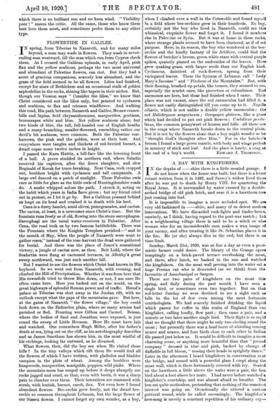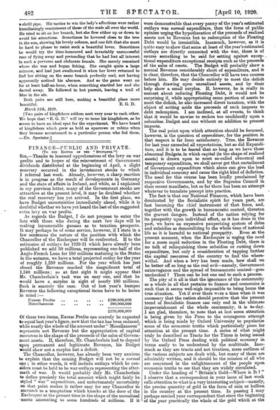A DAY WITH KINGFISHERS.
IN the depths of —shire there is a little moated grange. I do not know when the house was built, but there is a letter extant written from it in 1492, and Surrey's widow lived thus after he was put to death by Henry VIII. for quartering the Royal Arms. It is surrounded by water crossed by a double- arched bridge of old pink brick, and near it is a hawthorn-tree just coming into leaf.
It is impossible to imagine a more secluded spot. We are very old-fashioned in —shire, and many of us detest modern innovations. We have discarded rush-lights and tinder-boxes, unwisely, as I think, having regard to the post-war match ; but in a neighbouring village there is said to be a witch or wise woman who for an inconsiderable sum makes a wax image of your enemy, and after treating it like St. Sebastian places it is the fire. He (or she) always dies in the end, but there is no time-limit.
Sunday, March 21st, 1920, was as fine a day as even a pessi- mistic farmer could desire. The library of the Grange opens temptingly on a brick-paved terrace overlooking the moat, and there, after lunch, we basked in the sun and watched the kingfishers. On the moat wall peering into the water sat a huge Persian cat who is descended (as we think) from the favourite of Assurbanipal or Sargon.
There are two pairs of kingfishers on the moat this spring, and daily during the past month I have seen a single bird, or sometimes even two together. But on that red-letter Sunday we were destined to see a sight such as falls to the lot of few even among the most fortunate ornithologists. We had scarcely finished drinking the liquid which passes for coffee in this realm of England than one kingfisher, calling loudly, flew past ; then came a pair, and a minute or two later another single bird. Their flight is so rapid that we thought that there might be only two circling round the moat ; but presently there was a loud burst of whistling coming nearer and nearer, and four birds close to each other in Indian file passed just below us. It would be difficult to imagine a more charming scene, or anything more beautiful than that " jocund company " dressed in blue and pink, backed by clumps of daffodils in full bloom, " tossing their heads in sprightly dance." Later in the afternoon I heard kingfishers in conversation near the bridge, and armed with a powerful glass I crept along the moat wall, which is there fortunately covered with ivy. Seated on the hawthorn a little above the water were a pair, the hen bird about a foot above her mate. I had never before watched a kingfisher's courtship, and was almost afraid to breathe. The hen sat quite motionless, pretending that nothing of the remotest interest was going on. Occasionally she uttered a curious guttural sound, while he called unceasingly. The kingfisher's love-song is merely a constant repetition of his ordinary cry-
a shrill pipe. His tactics to win the lady's affections were rather humiliatingly reminiscent of those of the male all over the world. He tried to sit on her branch, but she flew either up or down to avoid his attentions. Sometimes he hovered close to the tree in the sun, showing his lovely colours, and one felt that she must be hard to please to resist such a beautiful lover. Sometimes he would try the time-honoured and invariably unsuccessful ruse of flying away and pretending that he had lost all interest in such a perverse and obdurate female. She merely remained where she was and began fishing. She caught quite a large minnow, and had Just swallowed it when her lover returned to find her sitting on the same branch perfectly cool, not having apparently noticed his absence. And so the game went on for at least half-an-hour, when something startled her and she darted away. He followed in hot pursuit, leaving a trail of blue in the air.
Both pairs are still here, making a beautiful place more [Two pairs of kingfishers seldom nest very near to each other. We hope that " E. G. D." will try to tame his kingfishers, as he seems to have an ideal spot for the experiment We have heard of kingfishers which grew as bold as sparrows or robins when they became accustomed to a particular person who fed them. —En. Spectator.]



































 Previous page
Previous page